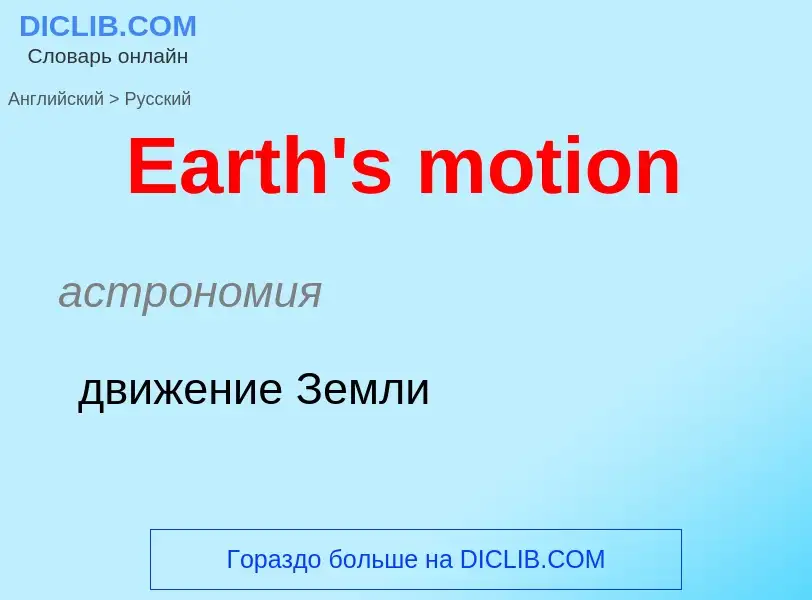Earth's motion - traducción al ruso
астрономия
движение Земли
['dilət(ə)ri]
прилагательное
общая лексика
оттягивающий
отсрочивающий
запоздалый
книжное выражение
медленный
медлительный
нерасторопный (о человеке)
синоним
Definición
1) Соотносящийся по знач. с сущ.: кукла (1*1), связанный с ним.
2) а) Свойственный кукле (1*1), характерный для нее.
б) перен. разг. Невыразительный, безжизненный.
3) перен. разг. Маленький - меньше обычного - нормального размера.
Wikipedia

Earth's energy budget accounts for the balance between the energy that Earth receives from the Sun and the energy the Earth loses back into outer space. Smaller energy sources, such as Earth's internal heat, are taken into consideration, but make a tiny contribution compared to solar energy. The energy budget also accounts for how energy moves through the climate system. Because the Sun heats the equatorial tropics more than the polar regions, received solar irradiance is unevenly distributed. As the energy seeks equilibrium across the planet, it drives interactions in Earth's climate system, i.e., Earth's water, ice, atmosphere, rocky crust, and all living things. The result is Earth's climate.
Earth's energy budget depends on many factors, such as atmospheric aerosols, greenhouse gases, the planet's surface albedo (reflectivity), clouds, vegetation, land use patterns, and more. When the incoming and outgoing energy fluxes are in balance, Earth is in radiative equilibrium and the climate system will be relatively stable. Global warming occurs when earth receives more energy than it gives back to space, and global cooling takes place when the outgoing energy is greater. Multiple types of measurements and observations show a warming imbalance since at least year 1970. The rate of heating from this human-caused event is without precedent.
When the energy budget changes, there is a delay before average global surface temperature changes significantly. This is due to the thermal inertia of the oceans, land and cryosphere. Accurate quantification of these energy flows and storage amounts is a requirement within most climate models.




![The growth in Earth's energy imbalance from satellite and [[in situ]] measurements (2005–2019). A rate of +1.0 W/m<sup>2</sup> summed over the planet's surface equates to a continuous heat uptake of about 500 [[terawatt]]s (~0.3% of the incident solar radiation).<ref name=GeophysResLtrs_20210615 /><ref name=em_20210622 /> The growth in Earth's energy imbalance from satellite and [[in situ]] measurements (2005–2019). A rate of +1.0 W/m<sup>2</sup> summed over the planet's surface equates to a continuous heat uptake of about 500 [[terawatt]]s (~0.3% of the incident solar radiation).<ref name=GeophysResLtrs_20210615 /><ref name=em_20210622 />](https://commons.wikimedia.org/wiki/Special:FilePath/Earth's heating rate since 2005.jpg?width=200)